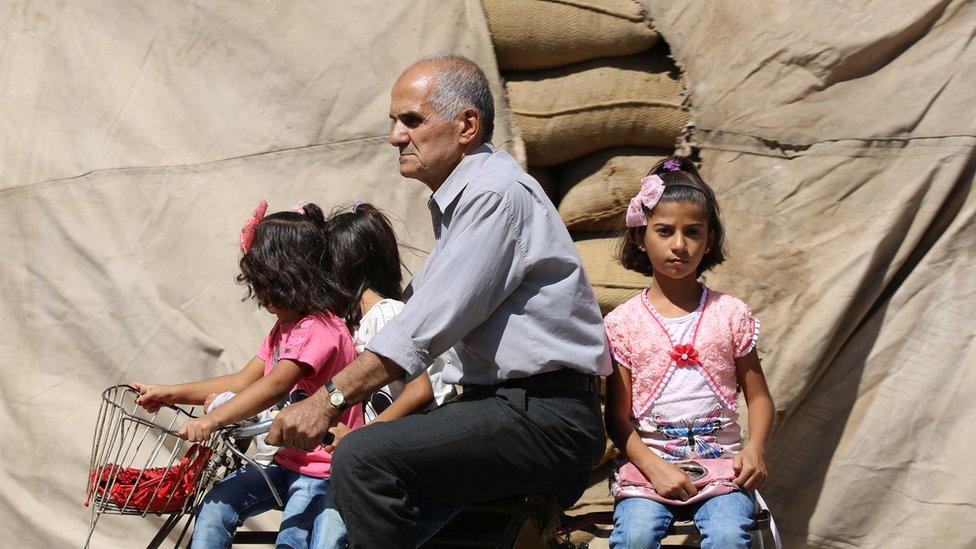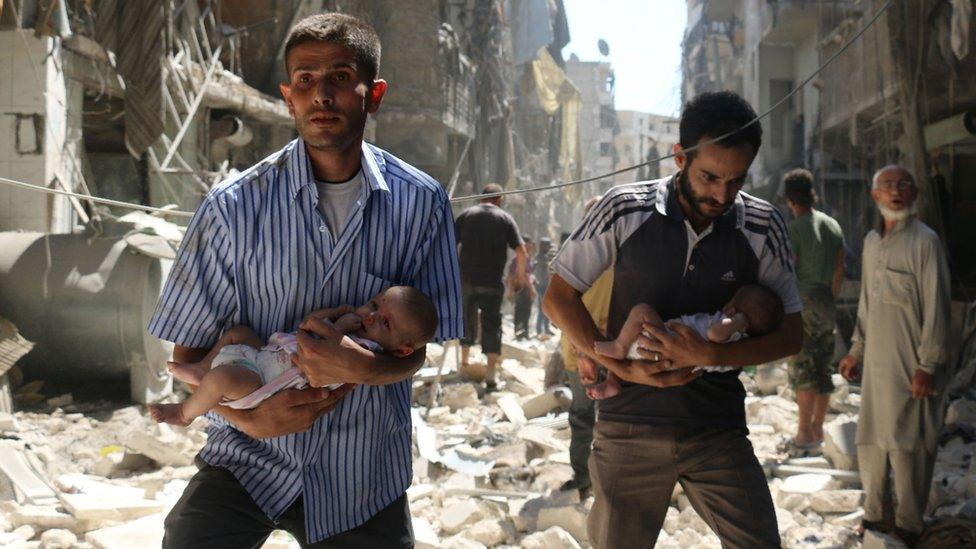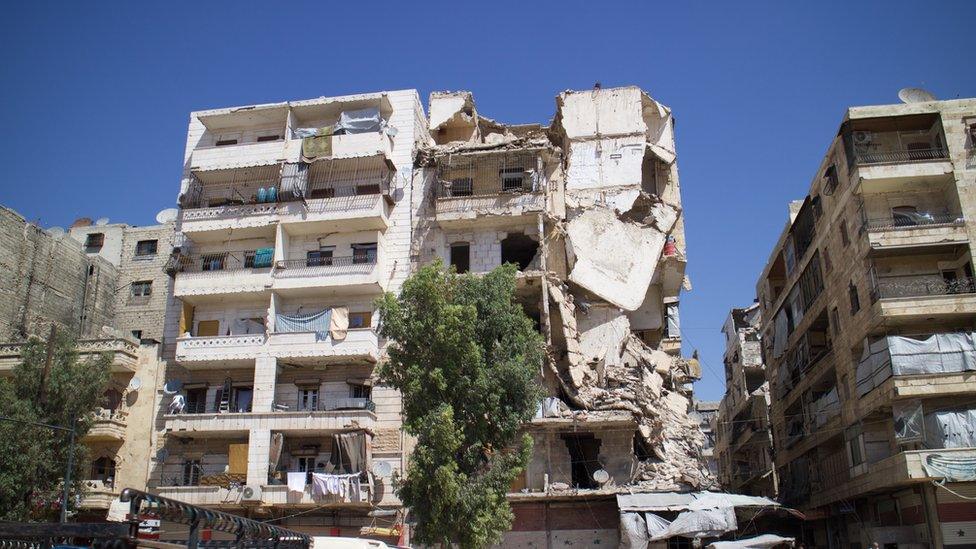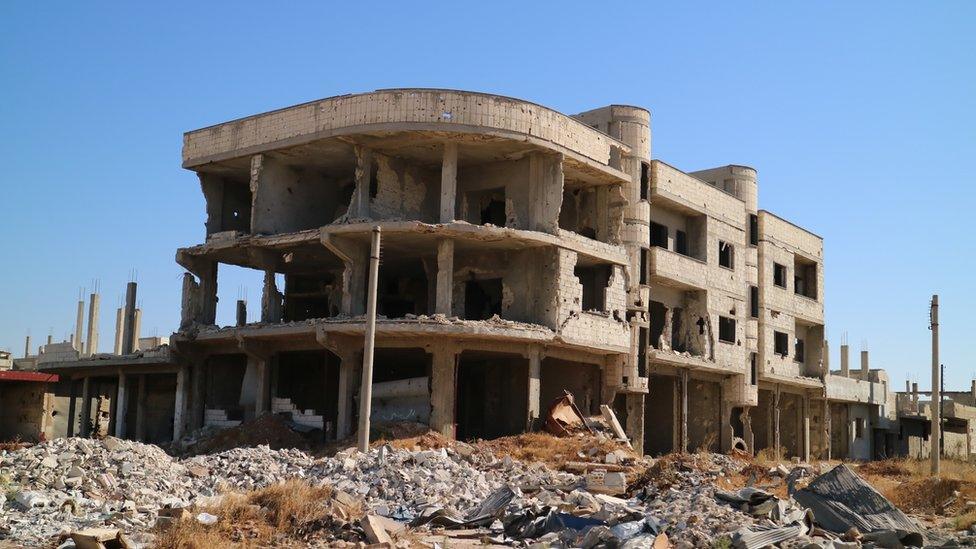Syria ceasefire: Emergency aid expected soon for Aleppo
- Published
Inside the fragmented city of Aleppo
Aid trucks are waiting to deliver supplies to besieged Syrians amid a nationwide ceasefire that largely appears to be holding on its first full day, the UN says.
It is hoped that emergency aid deliveries will start on Wednesday.
Russian forces are monitoring the ceasefire along a key access road in northern Syria that leads to rebel-held eastern Aleppo, reports say.
Some 250,000 civilians are trapped there.
UN Special Envoy for Syria Staffan de Mistura said if the truce held, aid deliveries "should be taking place very, very soon".
He said the UN was waiting for the Syrian government to authorise deliveries and he hoped the people of Syria could look forward to "no bombs and more trucks".
Since the truce came into effect at sunset on Monday, accusations have been made against both rebels and government forces for sporadically violating it.
But there have been no reports of civilian deaths so far.
The Russian military claims US-backed groups have violated the ceasefire more than 20 times. including killing two government troops on the Castello road, which leads to rebel-held Aleppo.
The Russian foreign ministry called on the US "to deal with their clients".

The ceasefire in Syria has largely held during its first full day

Residents of rebel-held Aleppo have been besieged
Russia has deployed reconnaissance equipment in Aleppo to detect and suppress ceasefire violations.
The Syrian Observatory for Human Rights, a UK-based monitoring group, said pro-government forces had shelled two villages near Aleppo and an area near Damascus.
It earlier said it had seen reports of aerial bombardment of some villages in Hama province.

Areas of control around Aleppo


The Syrian government says it will not allow aid, particularly "from the Turkish regime", to be delivered to Aleppo without prior co-ordination with it and the UN, state media report.
The UN says its trucks will not move until peace is assured.
"We need to enter an environment where we are not in mortal danger," Jens Laerke, a spokesman for the UN's humanitarian office (OCHA) said.
The head of rebel-held Aleppo's city council told Reuters news agency that residents there were in desperate need of fuel, flour, wheat, baby milk and medicines.
US Secretary of State John Kerry called on Friday for the Castello road to be demilitarised and said the US would work with Russia to free the route for aid convoys to reach Aleppo.
The truce
The Syrian army has said the truce will be applied throughout Syria for seven days, but that it reserves the right to respond decisively to any violation by armed groups.
A number of rebel factions have given a guarded welcome to the deal but expressed reservations about its implementation.
Two Russian officers were caught in a firefight on Tuesday as they described the ceasefire around Aleppo
A statement from 21 opposition factions including the Free Syrian Army said they were "fully aware of the trap being set to make us sink in a quagmire of concessions or lead us to infighting that divides our ranks and disunites us".
They said they opposed the targeting of Jabhat Fateh al-Sham (known until recently as the Nusra Front) which recently split from al-Qaeda "as this would weaken the military power of the revolution and strengthen the Assad regime and its allies".

Families have returned to safer parts of Aleppo, but many to badly damaged homes
If the truce holds for seven days, a key part of the deal is that the US and Russia will carry out co-ordinated air strikes on militant groups - including so-called Islamic State and Jabhat Fateh al-Sham.
The deal, described by Mr Kerry as the "last chance to save a united Syria", was struck on Friday in Geneva after months of talks between Russia and the US. It requires both sides to allow unhindered access for humanitarian aid.

Entire districts of the city of Homs have been abandoned
The number of deaths recorded since the beginning of the conflict in March 2011 has now risen past 300,000, according to the Syrian Observatory for Human Rights.
However, it said it estimated the full death toll to be about 430,000.
More than 4.8 million have fled abroad, and an estimated 6.5 million others have been displaced within the country, the UN says.

If the truce holds...

Government forces have regained ground in Aleppo
Jihadist groups like so-called Islamic State and Jabhat Fateh al-Sham face the joint might of the Russian and US air forces
Moderate rebels and civilians in the areas they hold will no longer face the threat of indiscriminate air strikes such as barrel-bombing although the Syrian air force will not be grounded completely; aid deliveries will be allowed to areas currently under siege
President Assad will be in a stronger position as the US and Russia engage two of his most effective military opponents while moderate rebels observe the truce with his forces

Syria's history of failed deals

Can Kerry (left) and Lavrov succeed at last?
February 2012: Syrian government "categorically rejects" an Arab League plan calling for a joint Arab-UN peacekeeping mission
June 2012/January 2014/January 2016: Three failed UN-sponsored peace conferences in Geneva
September 2013: Kerry and Lavrov negotiate a deal to strip the Syrian government of its chemical weapons in return for the US backing away from air strikes. Since then, the government has again and repeatedly been accused of using toxic chemicals against rebel-held areas
February 2016: World powers agree in Munich on a nationwide "cessation of hostilities" in Syria excluding jihadist groups. There is no agreement on any joint US-Russian operations. The "pause" quickly unravels as Assad promises to regain control of the whole country
March 2016: President Vladimir Putin declares "mission accomplished" in Syria and orders removal of "main part" of Russia's air army in Syria. Russian air strikes have continued ever since